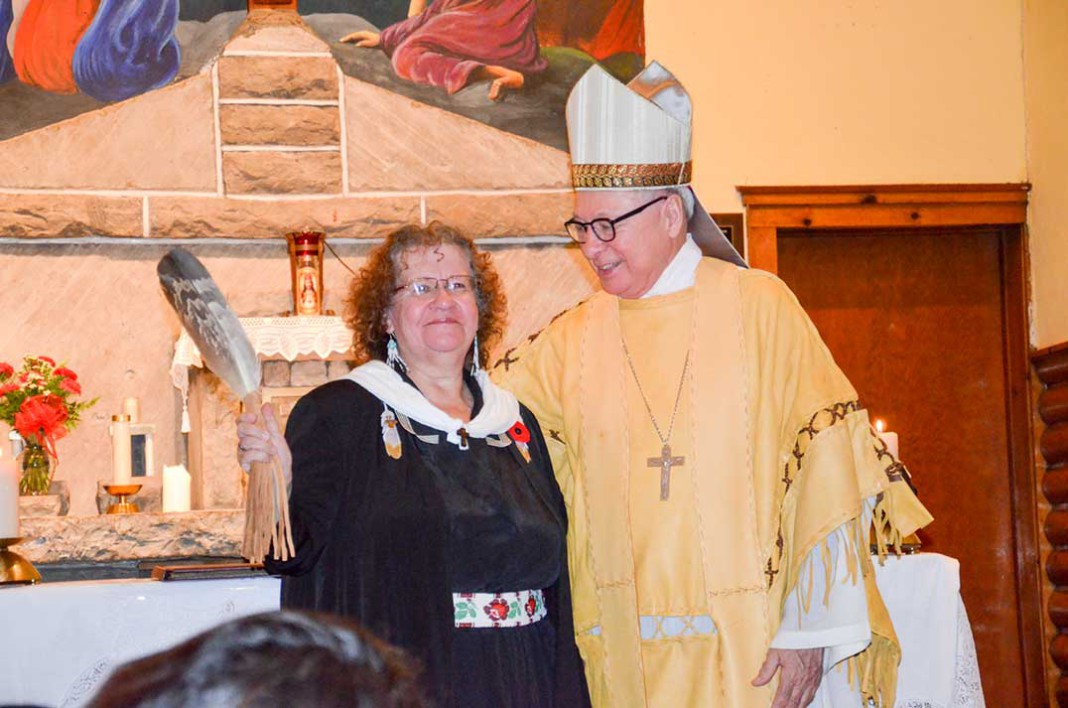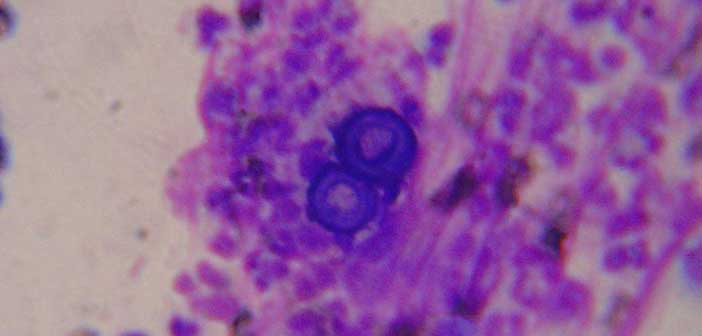BIRCH ISLAND—In his last official act as Bishop of the Diocese of Sault Ste. Marie Jean Louis Plouffe mandated Dianne Musgrove of Whitefish River First Nation as a member of the Diocesan Order of Service (DOS).
The ceremony took place at St. Gabriel Lalemant Roman Catholic Church in Birch Island and was attended by many of the Anishinaabekwe members of the lay order, the Island Jesuit priests from Anderson Lake, as well as many members of the Roman Catholic community from across Manitoulin.
In his address to the congregation, Bishop Plouffe noted that Pope Francis has announced the Extraordinary Jubilee of Mercy will be celebrated in 2016, making this celebration particularly poignant. “Wherever we are, across the diocese, there is much desire for reconciliation,” said Bishop Plouffe. He relayed to the congregation how Pope Francis washes the feet. “‘I am a sinner’ he says, he has been saying this since his elevation to office,” he continued. “Well, believe it or not, we are all sinners.” The bishop went on to note that “these are the kind of leaders we need, leaders who serve and are happy to be following God’s way.”
Bishop Plouffe noted that he wanted to complete the mandating of Ms. Musgrove at that moment, apologizing for the Friday night timing, adding that as he had submitted his mandatory retirement letter and could be replaced at any time, this was the only window available in his remaining calendar.
Whitefish River First Nation Chief Shining Turtle (Franklin Paibomsai) congratulated Ms. Musgrove on her mandating as a DOS and her ongoing commitment to the community. “Thank you to the bishop and all those who are here in prayer for her, including Dianne in the ministry here in our parish, our home, our lands,” he said. “Dianne, you have been committed and passionate in your service to this parish.”
Chief Shining Turtle went on to speak of three things: spirit, and how a church is just a building until people bring their spirits within its walls; truth, and how he has struggled with various streams of truth he has been presented with throughout his 14 years as chief; and reconciliation, noting that “there are differences between us,” some which last hours, some lasting days and some that linger from year to year.
“In your hands more than mine lies the fate of our community,” said Chief Shining Turtle to the initiate.
Following the remarks and official mandating, local members of the DOS smudged Ms. Musgrove before adorning her with the scarf, which acts as the traditional raiment of their order, and blessing her with eagle feathers.
Ms. Musgrove, visibly moved by the ceremony and outpouring of blessings from her well-wishers, committed her service to the community and her order.

In a note posted on the Anishinaabe Spiritual Centre website, Justin Dittrick explains the history and role of the DOS. “The Diocesan Order of Service (DOS), formerly known as the Diocesan Order of Women (DOW), was inaugurated in 1975. The Order is unique to the Sault Ste. Marie Diocese. Initially, it was a title bestowed on the wife of a deacon. Today, it is granted to any layperson, man or woman, who wishes to make a lasting commitment to service in the Church. With fewer deacons being ordained in the Sault Ste. Marie diocese, the role of the Diocesan Order of Service has undergone a transformation. Formerly, the DOS served as a reader and acolyte. Now, DOS perform some of the activities that the priests would have carried out in the past. A DOS can preside at Communion services, and distribute the Eucharist. A DOS can also lead wake services and minister to the sick. DOS often perform purification rites which involve the Native practice of smudging. This assumption of a greater number of responsibilities has made the DOS important spiritual leaders in the Sault Ste. Marie faith community.
The goal of the DOS ministry has been twofold: to assist priests and deacons in ministry and, especially within the First Nations parishes, to encourage First Nations peoples to become leaders in their Catholic faith communities. Since Vatican II, there has been a growing recognition that Christian lay people are called to ministry. Lay Ministries, including the positions of Eucharistic minister, lector, and acolyte, were created in response.
For formation, DOS complete a four-year program under the supervision of a spiritual director. This director can be a priest, deacon, religious brother or sister, or a layperson with training in spiritual direction. The formation process concludes once the DOS has been mandated. The mandating is not a sacrament, but a commissioning. Once the DOS is mandated, she (or he) begins her (or his) work in the Church and community.”




